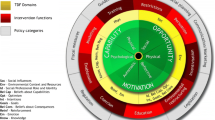Abstract
American Indians residing in the Northern Plains region of the Indian Health Service experience some of the most severe cancer-related health disparities. We investigated ways in which the community climate among an American Indian population in an urban community in the Northern Plains region influences community readiness to address cancer. A Community Readiness Assessment, following the Community Readiness Model, conducted semi-structured interviews with eight educators, eight students, and eight community leaders from the American Indian community in Omaha’s urban American Indian population and established the Northern Plains region community at a low level of readiness to address cancer. This study reports on a subsequent qualitative study that analyzed all 24 interview transcriptions for emergent themes to help understand the prevailing attitude of the community toward cancer. A synthesis of six emergent themes revealed that the community’s perceptions of high levels of severity and barriers, paired with perceptions of low levels of susceptibility and benefits, lead to low levels of self-efficacy, all of which are reflected in minimal cues to action and little effort to address cancer. These findings, interpreted through the lens of the Health Belief Model, can inform the development of more community-based, comprehensive, and culturally appropriate approaches to address the multilevel determinants of health behaviors in relation to cancer among American Indians in the Northern Plains region.

Similar content being viewed by others
References
Espey DK, Wu X-C, Swan J, Wiggins C, Jim MA, Ward E, Wingo PA, Howe HL, Ries LAG, Miller BA (2007) Annual report to the nation on the status of cancer, 1975–2004, featuring cancer in American Indians and Alaska natives. Cancer 110:2119–2152
Espey DK, Paisano RE, Cobb N (2003) Cancer mortality among American Indians and Alaska natives: regional differences, 1994–1998. Indian Health Service, Rockville https://digitalrepository.unm.edu/cgi/viewcontent.cgi?article=1035&context=nhd. Accessed 30 Oct 2019
Watanabe-Galloway S, Flom N, Xu L, Duran T, Frerichs L, Kennedy F, Smith CB, Jaiyeola AO (2011) Cancer-related disparities and opportunities for intervention in Northern Plains American Indian communities. Public Health Rep 126:318–329
Guadagnolo BA, Cina K, Helbig P, Molloy K, Reiner M, Cook EF, Petereit DG (2009) Medical mistrust and less satisfaction with health care among native Americans presenting for cancer treatment. J Health Care Poor Underserved 20:210–226. https://doi.org/10.1353/hpu.0.0108
Juarez G, Mayorga L, Hurria A, Ferrell B (2013) Survivorship education for Latina breast cancer survivors: empowering survivors through education. Psicooncologia 10:57–68. https://doi.org/10.5209/rev_PSIC.2013.v10.41947
Petereit DG, Burhansstipanov L (2008) Establishing trusting partnerships for successful recruitment of American Indians to clinical trials. Cancer Control 15:260–268. https://doi.org/10.1177/107327480801500310
Harjo LD, Burhansstipanov L, Lindstrom D (2014) Rationale for “cultural” native patient navigators in Indian country. J Cancer Educ 29:414–419
Watanabe-Galloway S, Zhang W, Kate W, Islam KM, Nayar P, Boilesen E, Lander L, Wang H, Qiu F (2014) Quality of end-of-life care among rural Medicare beneficiaries with colorectal cancer. J Rural Health 30:397–405
Plested BA, Jumper-Thurman P, Edwards RW (2009) Community readiness: advancing HIV/AIDS prevention in native communities (community readiness model manual, revised). Ethnic Studies Department, Colorado State University, Fort Collins http://www.oneskycenter.org/wp-content/uploads/2014/03/CommunityReadinessManual_FINAL.pdf. Accessed 30 Oct 2019
Urban Indian Health Commission (2007) Invisible tribes: urban Indians and their health in a changing world. Urban Indian Health Commission, Seattle https://www.google.com/url?sa=t&rct=j&q=&esrc=s&source=web&cd=1&cad=rja&uact=8&ved=2ahUKEwjN3PrswsnlAhUMWqwKHQlcAG8QFjAAegQIBRAC&url=https%3A%2F%2Fwww2.census.gov%2Fcac%2Fnac%2Fmeetings%2F2015-10-13%2Finvisible-tribes.pdf&usg=AOvVaw1tk1whVsIaED8GgJSLt0EJ. Accessed 30 Oct 2019
Norris T, Vines PL, Hoeffel EM (2012) The American Indian and Alaska Native Population: 2010: US Census Bureau. https://www.google.com/url?sa=t&rct=j&q=&esrc=s&source=web&cd=4&cad=rja&uact=8&ved=2ahUKEwin0ZKoxcnlAhUBL6wKHWbcDTAQFjADegQIAxAC&url=https%3A%2F%2Fwww.census.gov%2Fhistory%2Fpdf%2Fc2010br-10.pdf&usg=AOvVaw05KEU7bS-RmJtzvJ822csD. Accessed 30 Oct 2019
Nebraska Urban Indian Health Coalition Inc (2019) FAQs Nebraska Urban Indian Medical Center. Nebraska Urban Indian Health Coalition. http://www.nuihc.com/faq/ Accessed 30 Oct 2019
Scarinci I, Bandura L, Hidalgo B, Cherrington A (2012) Development of a theory based, culturally relevant intervention on cervical cancer prevention among Latina immigrants using intervention mapping. Health Promot Pract 13:29–40
Gale NK, Heath G, Cameron E, Rashid S, Redwood S (2013) Using the framework method for the analysis of qualitative data in multi-disciplinary health research. BMC Med Res Methodol 13:117
Glanz K, Bishop DB (2010) The role of behavioral science theory in development and implementation of public health interventions. Annu Rev Public Health 31:399–418
Champion VL, Skinner CS (2008) The health belief model. In: Glanz K, Rimer BK, Viswanath K (eds) Health behavior and health education: theory, research, and practice. Jossey-Bass, San Francisco, pp 45–62
Jones CL, Jensen JD, Scherr CL, Brown NR, Christy K, Weaver J (2015) The health belief model as an explanatory framework in communication research: exploring parallel, serial, and moderated mediation. Health Commun 30:566–576
Burhansstipanov L, Krebs LU, Harjo L, Ragan K, Kaur JS, Marsh V, Painter D (2018) Findings from American Indian needs assessments. J Cancer Educ 33:576–582
Griffin MJ (2011) Health belief model, social support, and intent to screen for colorectal cancer in older African American men. University of North Carolina at Greensboro, Greensboro https://libres.uncg.edu/ir/uncg/f/Griffin_uncg_0154D_10607.pdf. Accessed 30 Oct 2019
Acknowledgments
The authors thank the Omaha Metro Area Urban Indian Community who shared stories, beliefs, and perspectives that are included in this article.
Funding
We appreciate the National Institute of Health National Cancer Institute for funding this project through the Youth Enjoy Science, YES, grant (NCI R25 CA221777) and the Fred & Pamela Buffett Cancer Center Core Grant (P30 CA036727).
Author information
Authors and Affiliations
Corresponding author
Additional information
Publisher’s Note
Springer Nature remains neutral with regard to jurisdictional claims in published maps and institutional affiliations.
Rights and permissions
About this article
Cite this article
Idoate, R., Gilbert, M., King, K.M. et al. Urban American Indian Community Health Beliefs Associated with Addressing Cancer in the Northern Plains Region. J Canc Educ 36, 996–1004 (2021). https://doi.org/10.1007/s13187-020-01727-z
Published:
Issue Date:
DOI: https://doi.org/10.1007/s13187-020-01727-z



